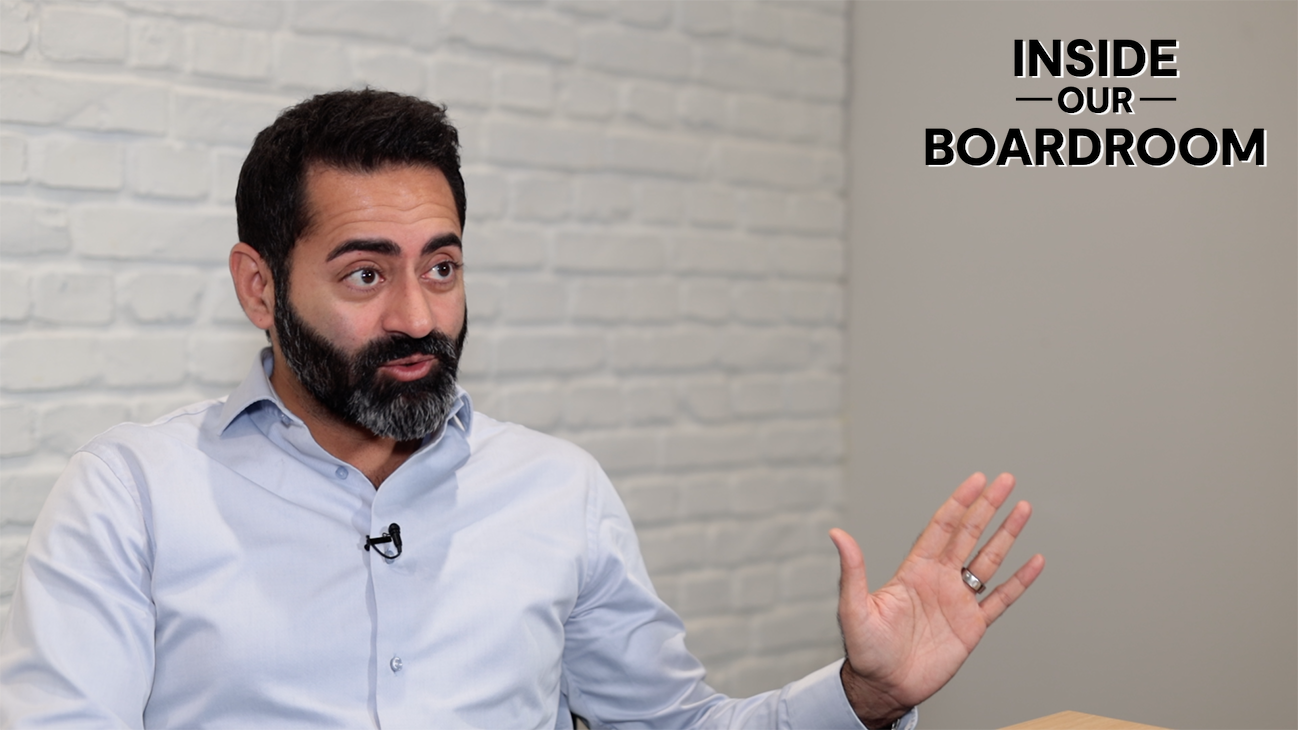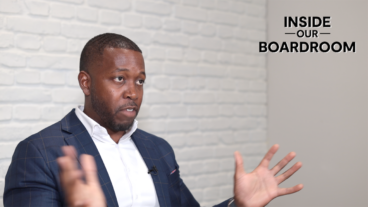We like to think of ourselves as rational decision-makers, but psychology tells us differently. We’re hard-wired to make bad decisions, prioritizing short-term gratification over long-term gains, but that doesn’t mean we can’t game the system.
Originally trained as a neuroscientist, Preet Banerjee now excels within the world of finance, renowned for his ability to take the complexity out of money matters. Drawing on his background in neuroscience and expertise in behavioural economics, he empowers audiences to make better financial decisions, despite our evolutionary tendencies, while aiding financial professionals to better serve their clients.
As part of our “Inside Our Boardroom” series, Preet sat down with us to discuss the future of finance, diving into the impact of AI on the financial sector, from both a consumer and industry perspective, while also sharing insight into how we can counter our natural impulses and make smarter financial decisions.
Answers have been edited for length and clarity.
The Impact of Psychology on Money Matters
Speakers Spotlight: What sparked your jump from neuroscience to finance?
Preet Banerjee: My undergraduate degree in university was in neuroscience, which is basically a combination of the brain and psychology. Even though what I’m doing now seems totally different than that, they’re actually incredibly intertwined. Anyone who deals with money knows that it’s mostly about psychology and very little to do with numbers. Financial success and making good decisions is 90% psychology and 10% math.
I went from studying neuroscience to auto racing and I actually trained to become a professional race car driver for an entire year. That’s actually how I made the leap into finance. I met someone in that world who said, when you’re done wasting your time here, I want you to come work for me. And his idea was to take the CFA and combine that with my background in neuroscience to become a biotech stock analyst. So that was the spark. That was the impetus for me to go into the world of finance. I worked in that industry for a while in various roles, and everything in that career showed me that making good decisions is really about understanding psychology.
Becoming Better Decision-Makers
SpSp: Why are we hard-wired for bad money decisions?
PB: We are literally hard-wired to make bad decisions. And when I say literally, I mean in the actual literal sense of the word. We are literally hard-wired to make bad decisions about money and other things. This goes back to a lot of work that evolutionary biologists have done.
The short version of it is that we’ve spent the bulk of our evolution, 99.999% trying to survive until tomorrow morning, which means we have a very short-term focus and the things we try to solve for are very primal. Any long-term decision, whether its strategy, business, money, etc., are ultimately long-term trade-off choices, and the part of our brain that deals with the long-term didn’t develop until very recent in our history. So, it’s not something by default that we do. We can do it, but our base instinct is to resort to maximizing our pleasure in the short term. The problem is you have to make trade-offs in the short-term if you want to make good long-term decisions.
SpSp: How can we counter our impulse to think short-term and start planning with the long term in mind?
PB: There’s this concept called hyperbolic discounting, which is a very technical term, but let me give an example of how it works.
Say I have an assistant who’s going to walk in the room right now with a freshly baked cinnamon roll — and I mean straight out of the oven. Then I ask you, would you like one free cinnamon roll right now or would you rather have two free cinnamon rolls in one week? Everyone I’ve ever talked to who’s honest will say, they’ll take the one cinnamon roll right now. They can’t help themselves even though rationally we know that two cinnamon rolls are better than one.
But what if I changed the question? I said, would you rather have one free cinnamon roll in one year or two free cinnamon rolls in one year plus one week? Now, everyone chooses to have two cinnamon rolls. If you look at the architecture of the question, it’s the same. Would you rather have one cinnamon roll at time X or two cinnamon rolls at time X plus one week? But when you change X, you make a totally different decision. So, what that tells us, is that we will make a different decision based on when it’s going to affect us.
So, no matter what kind of decisions you’re making as a business leader when it comes to strategy or about personal finances, or if you’re a financial advisor working with a client and they’re not willing to make a decision today because it’s so hard to, ask them to pre-commit to a decision when they’re going to get an increase in income down the road. Plan for how that money will be used in advance, not when you get it, because when you get it, the temptation of the here and now is too powerful.
Preet shares more examples of how we can re-phrase questions to enhance our decision-making skills in the video below.
Uncertainty and Better Decision-Making
SpSp: When there’s fear in the market, what are things we should be doing?
PB: Normally, when there’s no pressure and no time constraint, we have a status quo bias, which is our tendency to not make changes. But when there is some kind of pressure component, when the headlines are flashing, the sky is falling, we have what’s called an action bias.
For example, researchers looked at soccer goalkeepers during penalty shootout situations. What they found was that 94% of the time under a penalty shot situation, the goalkeepers would dive to the left or the right. They’re basically always diving. Even if you were to go and tell those goalkeepers that if they stood in the middle, they would block more shots, win more games, and make more money, they would still dive to the left or the right. Why? Because they are being highly scrutinized by all the fans in the stand and they’re all saying you better do something under this high-pressure situation.
Sometimes the best thing to do is to just stick to the plan that you developed. The problem is, if you went to someone and said, listen, don’t do anything, things will play out, you come across as being flippant.
AI and the Future of Finance
SpSp: What should we be thinking about as AI takes a bigger role in finance?
PB: I think what people are getting wrong about AI is thinking that they think it’s taking centre stage. What it’s actually doing is freeing us up to have more meaningful connections with people, to truly understand what it is they want. So, it’s actually enhancing human connection.
For example, in the wealth management space, we’ve seen a shift in portfolio management. You don’t have to spend as much time worrying about optimizing a portfolio. We’re starting to see AI being used in financial planning and coming up with different scenarios and solving for complex calculations. So, you don’t have to spend days on end creating a financial plan
You do however still need to understand what the client wants, what they want to achieve, and what their capabilities are, and that is an emotional connection, something only people are capable of doing. So, AI is actually increasing the value of a good financial advisor, and it’s increasing the chasm between people who are just financial salespeople and people who are truly financial professionals.
Preet dives deeper the impact of AI on the financial industry further in the video below, particularly looking at robo-advisor roles and their AI evolution. In his keynote, “AI and the Art of Racing: Steering Through the Future of Financial Services”, Preet intertwines the adrenaline-fueled world of professional racing with the dynamic realm of financial services to explore the critical role of human expertise in an AI-dominated financial future.
Hire Preet Banerjee to Speak at Your Event
Book Preet Banerjee for your next event to gain powerful insights into the psychology of decision-making, the future of finance, and the role of AI in financial services. Whether you’re looking to help your audience make smarter financial choices or understand the evolving financial landscape, Preet delivers engaging, thought-provoking keynotes that leave a lasting impact. Contact us today to learn more.




